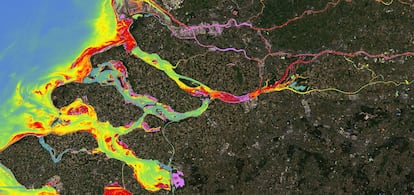The company using AI to detect sea pollution from satellite images
Fregata Space has created algorithms that can identify the presence of hydrocarbons, plastics and microscopic organisms

For the team at Fregata Space, satellite images are all that are needed to determine the pollution levels in the planet’s waters. The company, founded in September 2020 in Barcelona, has developed its own algorithms to detect the presence of hydrocarbons, plastics and microscopic organisms such as cyanobacteria in the ocean and sea. It’s an idea that has won Fregata Space a score of awards, and that has slowly turned into the company’s main business model.
Fregata Space was founded by María Fernanda González, who studied physics in her home country of Colombia before completing a master’s in numerical methods and PhD in quantum physics in Spain. González began her career working as a consultant, analyzing large volumes of data for big clients in the communication, energy and health sector. At the beginning of 2010, she created her first start-up, Moca Platform — which was focused on data analysis— and shortly after, she founded her second, Innoquant — which studies mobility in cities based on cellphone data, and can create recommendations according to a user’s location. Her scientific knowledge helped her generate business for both startups. But González was after more. “I wanted the companies to also have a social purpose,” she explains. As a nature lover, she decided to launch Fregata Space to “help ensure a healthier ecosystem.”
The company has created algorithms that can interpret satellite images. These photos come from public entities — such as the European Space Agency and NASA — as well as from private companies. The system developed by her team analyzes the wavelengths of the images and transforms them into pollution levels. In this way, they can find out, for example, if there is a slick due to an oil spill, the level of plastics in a certain are or even if there is dissolved organic matter, which in large concentrations also affects the health of the planet’s water.
Using artificial intelligence, the team measures factors that allow them to know key information, such as whether there is a harmful algal boom in the Mediterranean. Fregata Space’s clients can consult the data via a platform that is accessible by subscription. The company is working with ports, which pay based on their size and the pollutants they want to monitor. Thanks to this monitoring program, users can access historical information, make predictions, check indicators in real time, establish alerts and track pollution anywhere in the world.
Nearly 20 organizations have awarded the company and offered it financial support. In 2021, Fregata Space was selected by the Netherlands’ PortXL acceleration program to study polluting agents in the port of Rotterdam, the largest port in Europe. “It was an intensive experience that helped us understand how the European port system works,” says González.
The team at Fregata Space is made up of 10 experts from disciplines such as astrophysics, mathematics, computer engineering, oceanography and biology. The company made €100,000 last year, and is forecast to make a turnover close to €500,000 this year. And it is already looking to take on new challenges. “The port sector is doing very well, but we want to analyze other markets in order to scale up and grow faster,” says González.
Sign up for our weekly newsletter to get more English-language news coverage from EL PAÍS USA Edition
Tu suscripción se está usando en otro dispositivo
¿Quieres añadir otro usuario a tu suscripción?
Si continúas leyendo en este dispositivo, no se podrá leer en el otro.
FlechaTu suscripción se está usando en otro dispositivo y solo puedes acceder a EL PAÍS desde un dispositivo a la vez.
Si quieres compartir tu cuenta, cambia tu suscripción a la modalidad Premium, así podrás añadir otro usuario. Cada uno accederá con su propia cuenta de email, lo que os permitirá personalizar vuestra experiencia en EL PAÍS.
¿Tienes una suscripción de empresa? Accede aquí para contratar más cuentas.
En el caso de no saber quién está usando tu cuenta, te recomendamos cambiar tu contraseña aquí.
Si decides continuar compartiendo tu cuenta, este mensaje se mostrará en tu dispositivo y en el de la otra persona que está usando tu cuenta de forma indefinida, afectando a tu experiencia de lectura. Puedes consultar aquí los términos y condiciones de la suscripción digital.









































